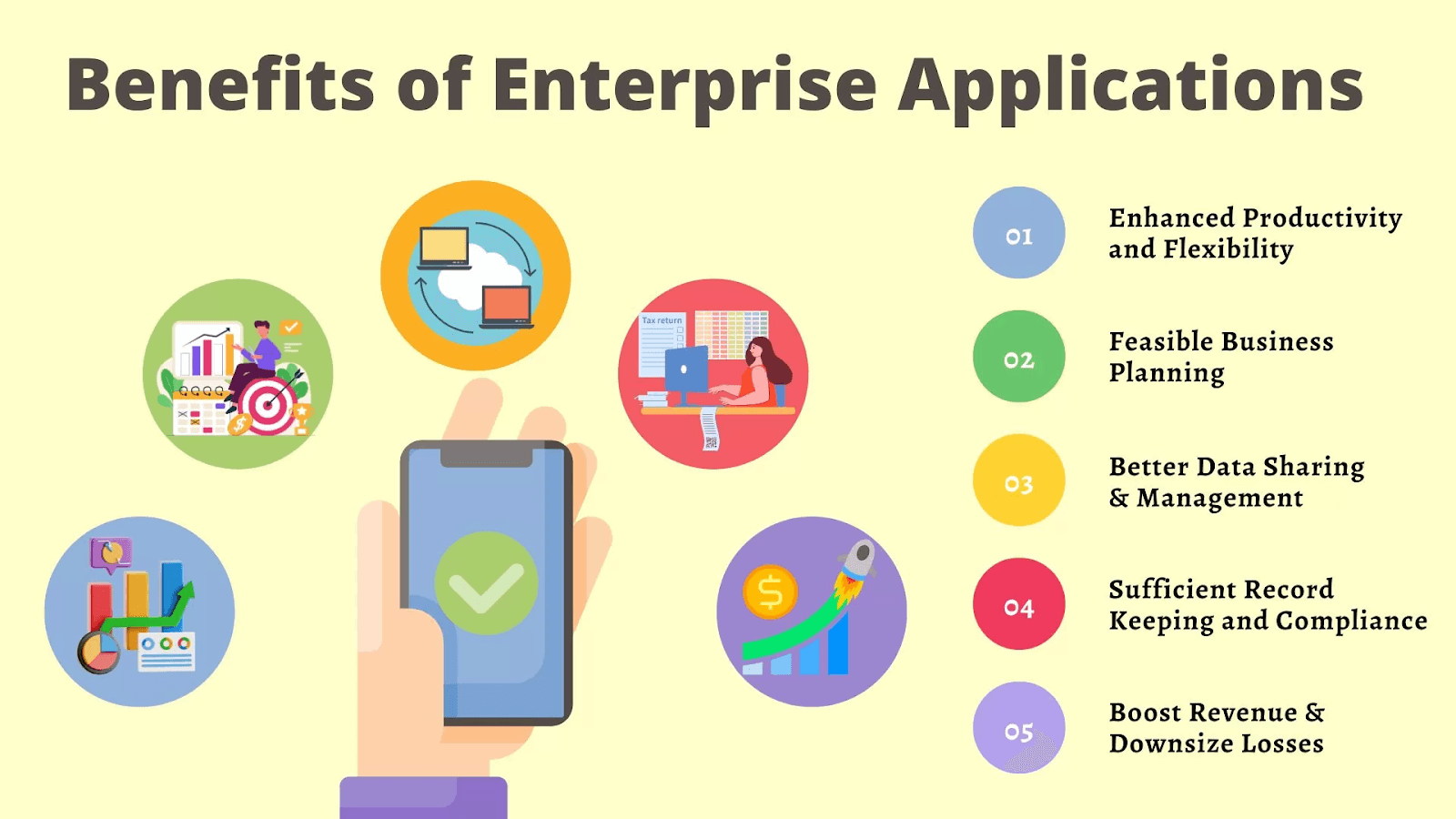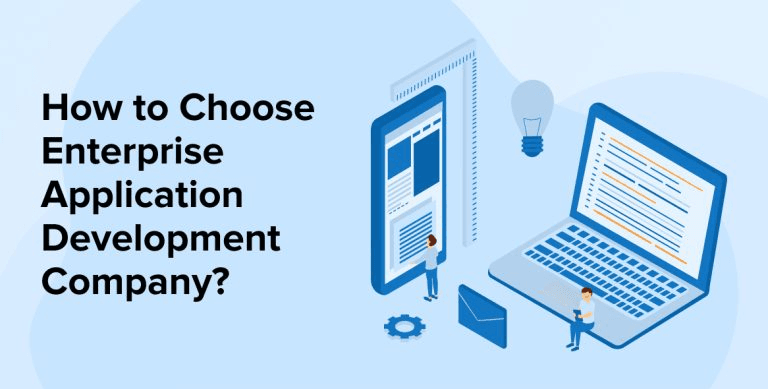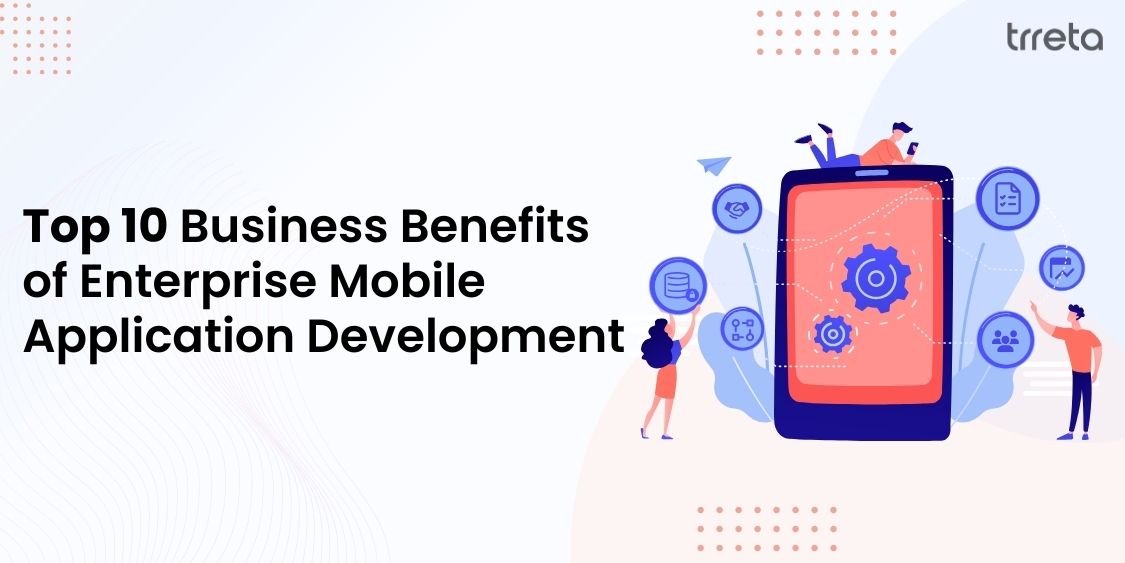You’ve got teams working across regions, customer expectations climbing every quarter, and operations that can’t afford to miss a beat.
That’s exactly why enterprise mobile applications have become less of an IT project and more of a strategic growth lever.
At its core, an enterprise mobile app is a custom-built, role-specific tool designed to give your teams the right information, right where they need it on the move.
At Trreta, we’ve worked with manufacturing companies, logistics providers, and retail giants like yours to build mobile systems that replace outdated workflows, reduce decision latency, and help leaders regain control in fast-moving environments.
In this blog, let’s break down the actual business value and benefits of building mobile enterprise application platform, not from a developer’s perspective, but from a decision-maker’s.
Real Business Impact: 10 Key Benefits of Enterprise Mobile Application Development

If you are planning to build mobile enterprise applications or take enterprise mobile application development services, here are some advantages that will make a real difference to your business!
1. Faster Internal Communication & Data Access
Say you’re managing a 500-person workforce across five locations. Waiting on weekly reports or email threads isn’t just inefficient but it also delays action.
In such situations, having a custom enterprise app puts everyone in sync, allowing secure document sharing, instant task updates, and real-time field communication from one place.
We’ve seen warehouse teams cut down internal task assignment times significantly just by using a centralized mobile dashboard.
2. Real-Time Decision Making on the Go
Enterprise leaders don’t have the luxury of being desk-bound. Whether you're walking the factory floor or flying out for a board meeting, your ability to make a call shouldn't depend on a laptop.
With mobile access to dashboards, KPIs, and live updates, decision-making becomes proactive instead of reactive. And that’s one of the major mobile application benefits for business.
For example, if you are in the BFSI sector, you can leverage enterprise mobile application security to approve branch-level transactions in minutes which may take hours otherwise.
3. Improved Field Team Coordination & Monitoring
Think of sales reps, service engineers, or on-ground supervisors. Their tasks are often buried in email chains, spreadsheets, or verbal updates.
With a purpose-built enterprise mobile application, field teams can log work, capture signatures, upload images, and get instant schedule changes without calling in.
And when you have improved field team coordination and monitoring, it means fewer missed deliveries and boost in customer satisfaction within two months.
4. Enhanced Customer Experience & Loyalty
While mobile apps are often associated with customer-facing interfaces, enterprise apps quietly power the service behind them.
When a support agent has real-time access to customer data, or when a delivery partner can log a concern on-site, customers feel heard and it builds loyalty, trust, and repeat business over a period of time.
In short, enterprise mobile applications don’t just serve internal needs but they sharpen the customer journey indirectly too.
5. Data-Driven Insights with Integrated AI/ML
Most enterprises collect huge amounts of data, but very few put it to work. With integrated AI/ML capabilities, mobile apps can now surface real-time suggestions like “Restock Item X,” “Customer Y likely to churn,” or “Field Team A has hit performance threshold.”
And these are the kinds of insights that shift businesses from reactive to predictive.
6. Reduced Operational Bottlenecks
Imagine this - a regional manager submits a request. It sits in someone’s inbox. No one knows who owns it. A week later, the opportunity is gone.
Now imagine that same request moving through a mobile workflow - assigned, escalated, approved - with every step logged, and everyone notified.
So, enterprise mobile apps remove the “who’s handling this?” bottlenecks that cost money and momentum in your business!
7. Seamless Integration With Existing ERP & CRM
Most enterprise systems like SAP, Microsoft Dynamics, Zoho aren’t going anywhere. But accessing them on mobile? That’s where the friction lies.
We build enterprise mobile application that don’t replace your ERP or CRM but extend it. Whether it’s pulling stock data from SAP or syncing contacts from Salesforce, it becomes easier.
8. Improved Compliance & Enterprise Mobile Application Security
Handling sensitive data across devices is risky unless security is taken care of from day one.
We’ve seen companies using generic apps and WhatsApp for internal updates. Which is fine until a phone is lost, or sensitive files are shared outside the organization.
With proper enterprise mobile application security, you control:
- Who sees what
- What happens if a device is compromised
- How data is stored and encrypted
At Trreta, every app build includes multi-layer access controls, encrypted databases, audit trails, and remote data wipe capabilities.
9. Scalable Infrastructure for Business Growth
The last thing you want is to outgrow your own software. A scalable mobile app grows with your business, whether you're adding 1,000 users next quarter or expanding to a new region.
We use modular architecture, so you can plug in new features, expand user roles, or add integrations without needing to rebuild.
10. Competitive Advantage Through Custom Features
Prebuilt tools can only take you so far. Need geofencing for delivery tracking? Or barcode scanning integrated with your warehouse ERP? Off-the-shelf software rarely fits.
With custom enterprise mobile development, you design workflows around your people, not the other way around. And in saturated markets, that agility becomes your edge.
Trreta’s engineering and strategy teams co-create and execute enterprise mobile application development services with clients to ensure every feature solves a problem, not just adds complexity.
Addressing Security: Why Enterprise Mobile Application Security Matters?

Today, every mobile app is a potential doorway into your systems unless it’s locked down tightly.
Here are some common risks:
- Employees using personal phones with no PINs
- Data cached without encryption
- Admin credentials stored in plain text
The good news is - we offer enterprise mobile application security by default not as an add-on. That includes:
- Biometric login
- OAuth 2.0 authentication
- Encrypted local storage
- Remote lock and data wipe
So that your mobile app does not just do more but also protect more.
How to Choose the Right Enterprise Mobile Application Development Company?

When evaluating enterprise mobile application development company, here’s what you should consider -
- Do they understand your business challenges, not just features?
- Can they integrate with your current stack?
- Is security something they bake in, or bolt on?
- Will they support you post-launch when things evolve?
At Trreta, we help enterprises rethink how work happens in a mobile-first world. From discovery to deployment, we act as your strategy + engineering partner.
Want to discuss more about your upcoming project? Get in touch with our team today!
FAQs on Enterprise Mobile Application Development
Q1. What are the top benefits of mobile apps for businesses?
Some of the top mobile application benefits for business includes faster communication, better decision-making, reduced manual errors, and increased field team visibility.
Q2. How much does it cost to build an enterprise mobile app?
The investment to build mobile enterprise application platform vary by complexity, but a custom mid-range app usually ranges between $30,000–$100,000, depending on features and integrations.
Q3. Can enterprise mobile apps be integrated with legacy systems?
Yes. With proper APIs and middleware, mobile apps can connect to most ERP, CRM, and internal tools securely.
Q4. Is AI integration possible in enterprise mobile applications?
Absolutely. From smart alerts to predictive analytics, AI features can be added based on your data models and goals.
Q5. What makes a mobile app development company reliable?
For any enterprise mobile application development company to be counted as a reliable partner, they need to provide strategic insight, technical depth, secure builds, integration capability, and ongoing support.




